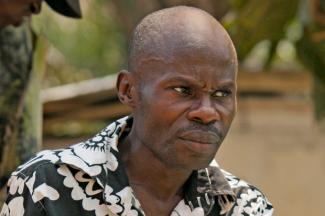Human rights
"Denied asistance"

“Pre-colonial reports indicate that homosexuality existed in Africa back then,” says Dorothy Aken’Ova from the International Center for Reproductive Health and Sexual Rights in Nigeria. She sees further evidence in the fact that many African languages have words for “gay”, “lesbian” or “homosexual” that were not taken from a Western language – contrary to words like “browsing” in computer terminology. Aken’Ova concludes that African politicians and religious leaders who consider homosexuality somehow un-African are totally wrong.
At a conference hosted by Germany’s Foreign Office and the non-governmental Hirschfeld-Eddy Foundation in Berlin in late November, church representatives met African LGBT-activists. The acronym stands for “lesbian, gay, bisexual and transgender”. One participant was Reverend Michael Kimindu from Kenya, the founder of Other Sheep Africa, an inclusive church. For his courage to explicitly invite homosexuals to his congregation, the Anglican church punished him with expulsion (note interview with Reverend Jide Macaulay from Nigeria in D+C/E+Z 2011/2, p. 84).
Kimindu says: “In churches, mosques and temples, there are people who are not reached by their religious leaders, because of their social status, the way they were born or human failures”. He does not only mention homo- and transsexuals, but also single parents, divorced, alcoholics and drug addicts. “The church forgot about them,” Kimindu states.
On the one hand, churches are turning away fom homosexuals and their supporters, but on the other hand, lesbians and gays are becoming ever less inclined to listen to Sunday sermons about their alleged sinfulness. The reluctance is so deep, that Kasha Nabagesera, an LGBT-activist from Uganda, initially said in Berlin: “If I had known what this is about, I wouldn’t have come here.”
In her country, evangelical fundamentalists from the US play a prominent role in stoking homophobia. Media campaigns publicly even called for the murder of gays and lesbians. In January 2011, the well-known gay activist David Kato was assaulted and beaten to death, after he had won a court case against a particularly aggressive newspaper.
“Christian churches are part of the problem, so they ought to contribute to the solution as well,” admonishes Tim Kuschnerus, the Protestant chief executive of Germany’s Joint Conference Church and Development, in which Catholics and Protestants take part. European missionaries spread homophobia in Africa, he adds, citing the study “Boy-wives and female husbands” by Will Roscoe and Stephen O. Murray.
Peter Jörgensen from the Union of Evangelical Free Churches in Germany agrees. He admits, that his organisation has not taken a clear stand on this issue. But in view of homophobic violence, he speaks of “denial of assistance”, which is a criminal offence in Germany.
LGBT activsts also had a closed meeting with Catholic leaders in Berlin. Participants later said that the church representatives were genuinely shocked about the persecution of homosexuals in Africa. Some participants said the meeting was “almost historic”. In any case, Kasha Nabagesera, the human rights activist from Uganda, cautiously revised her position towards cooperation with churches. “Here in Berlin, I met people who have been active in Uganda for 20 years. They can change something. Preachers can always talk.”






